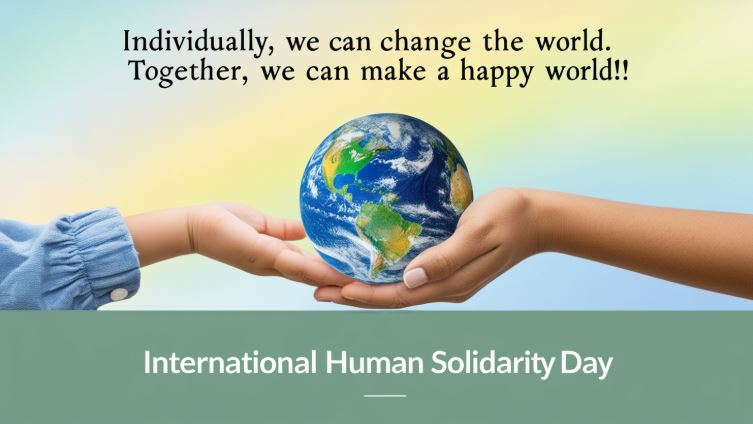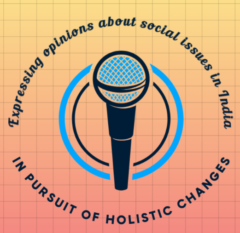
International Human Solidarity Day is observed on December 20 each year. Infact, this day emphasizes the importance of unity in addressing global challenges. Significantly, the theme for 2024 is “Promote togetherness and collaboration“.” Undoubtedly, this theme is crucial for India, as the nation faces various social issues that compromise human solidarity. In addition, International Human Solidarity Day in India highlights our shared responsibility to foster unity and tackle pressing social issues together.
Understanding Human Solidarity in India
Human solidarity in India reflects our shared humanity. Moreover, it encourages cooperation among individuals and communities. However, India faces significant challenges that threaten this fundamental value. To make matters worse, economic disparities, social injustice, and environmental crises create divisions among people.
According to a recent report, around 364 million people in India live below the poverty line. Alarmingly, this staggering figure highlights the urgent need for solidarity to uplift the marginalized and ensure equitable development.
History and Significance of International Human Solidarity Day
The United Nations established International Human Solidarity Day in 2005. In particular, it aims to promote solidarity as a universal value essential for achieving social justice and sustainable development. Besides, the day serves as a reminder of our collective responsibilities towards one another.
In India, the significance of this day is profound. Apparently, it encourages discussions on fostering unity amidst diversity. To quote Mahatma Gandhi, “The best way to find yourself is to lose yourself in the service of others.” Clearly, this quote encapsulates the essence of human solidarity in India.
Challenges to Human Solidarity in India
Economic Inequality
Economic inequality is one of India’s most pressing issues today. To put things in perspective, this wealth gap continues to widen, leaving many behind. To prove this, according to Oxfam’s report, India’s richest 1% hold more than 40% of the country’s wealth. As a matter of fact, this disparity undermines human solidarity by creating divisions based on economic status.
The government must implement policies that promote wealth redistribution. In this context, initiatives like progressive taxation can help bridge this gap. Additionally, increasing access to education and job opportunities can empower marginalized communities.
Climate Change
Climate change poses a significant threat to human solidarity in India. Without a doubt, vulnerable populations are disproportionately affected by environmental disasters. For instance, floods and droughts disrupt livelihoods and exacerbate poverty.
The government should prioritize sustainable development practices. In this regard, investing in renewable energy and disaster management can mitigate these impacts. As Dr. A.P.J Abdul Kalam stated, “We must think and work together.” Most importantly, collective efforts are essential for addressing climate challenges.
Social Justice Movements
Social justice movements are crucial for fostering human solidarity in India. However, these movements often face resistance. In addition, issues related to caste discrimination, gender inequality, minority rights and religious intolerance persist.
The government must support these movements through policy reforms. Clearly, ensuring equal rights and protections for all citizens is vital for promoting unity. As noted by Dr. B.R. Ambedkar, “I measure the progress of a community by the degree of progress which women have achieved.” Also, empowering women is key to achieving social justice.
Inculcating Human Solidarity in India
Education and Awareness
Education plays a crucial role in promoting human solidarity in India. Obviously, schools should incorporate lessons on empathy and cooperation into their curriculums. Moreover, raising awareness about social issues can inspire action among students.
Community programs can also educate citizens about the importance of solidarity. Indeed, workshops and seminars can facilitate discussions on pressing issues like poverty and inequality.
Government Accountability
Governments must be held accountable for their commitments to international agreements on human rights and development goals. Importantly, regular assessments of progress towards these goals can ensure transparency.
Public participation in governance can also enhance accountability. For this, citizens should have a voice in decision-making processes that affect their lives.
Grassroots Initiatives
Grassroots initiatives are essential for fostering human solidarity at the community level. Notably, local organizations can address specific needs within their communities effectively.
The government should support these initiatives through funding and resources. In addition, encouraging volunteerism can also strengthen community bonds.
Conclusion: A Call for Holistic Change
In conclusion, fostering human solidarity in India is vital for progress. In this context, addressing economic inequality, climate change, social justice issues, digital divides, and political polarization requires collective action.
To bring about meaningful change, holistic reforms are necessary:
- Promote equitable economic policies that uplift marginalized communities.
- Invest in sustainable practices that protect vulnerable populations.
- Support social justice movements through policy reforms.
- Bridge the digital divide by improving access to technology.
- Encourage political dialogue that fosters unity among diverse groups.
As we observe International Human Solidarity Day on December 20th, let us reflect on our shared responsibilities towards one another. Collectively, we can build a more inclusive society where every individual feels valued and empowered.
Call to Action: Join hands with local organizations today! Volunteer your time or resources to support those in need within your community! Together, we can make a difference!

I’m cynical.
As long as the world exists there will be ‘haves’ and have-nots.
All kind of disparity exists in this world.
20% of the world population enjoy 80% of all the world’s resources; 80% of the population have to be content with 20% of resources.
If any change has to happen the world leaders ought to take initiatives to remove disparity.
Look at the world leaders of US, Russia, China, North Korea, India and others.
Can we expect anything good from them?
Thank you, sir, for your observations. Yes, disparity, especially economic disparity is a social malice that is pulling our nation back in terms of growth and development. More measures need to be taken to bridge this gap, in terms of poverty alleviation, food security, rural development, healthcare access for everyone, education for all, creating more jobs, digital literacy for all, social welfare measures for the economically weaker sections, and a host of other measures that will considerably bridge this gap between the haves and have nots. NGOs should also focus their attention primarily in this regard.